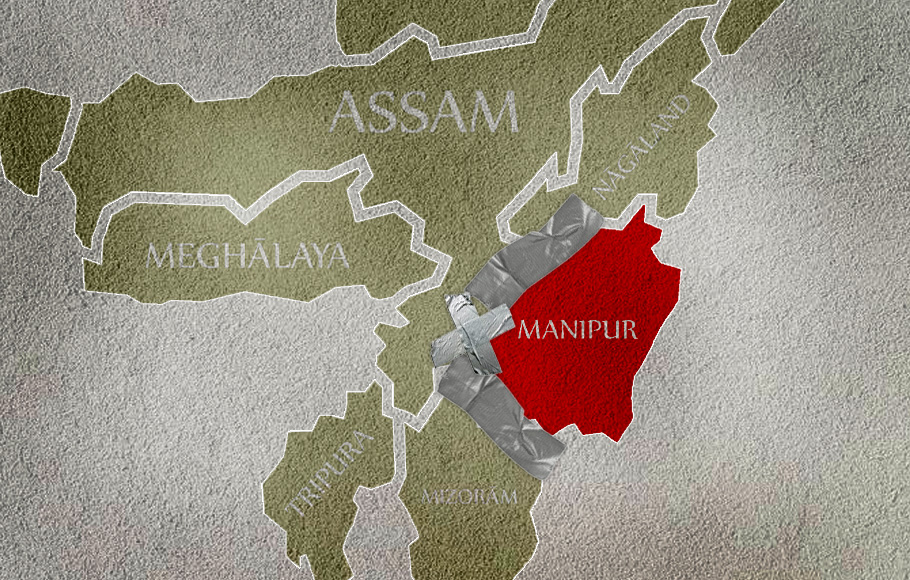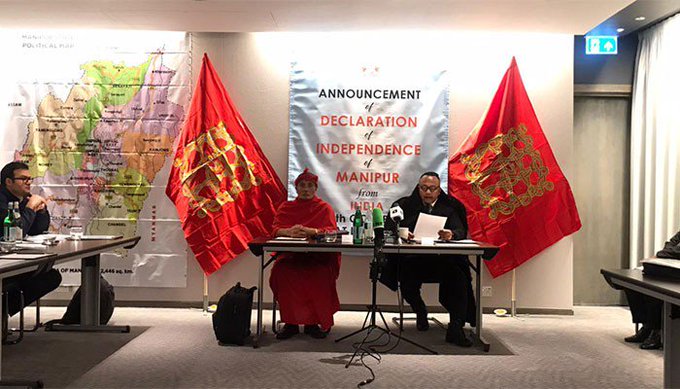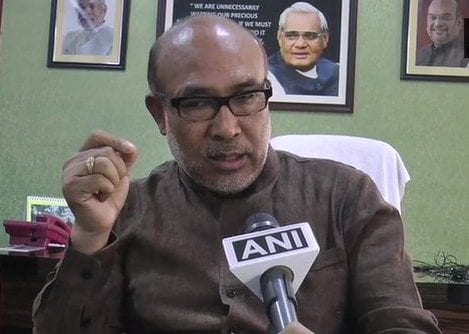
- Home
- News
- Analysis
- States
- Perspective
- Videos
- Education
- Entertainment
- Elections
- World Cup 2023
- Features
- Health
- Business
- Series
- Economy Series
- Earth Day
- Kashmir’s Frozen Turbulence
- India@75
- The legend of Ramjanmabhoomi
- Liberalisation@30
- How to tame a dragon
- Celebrating biodiversity
- Farm Matters
- 50 days of solitude
- Bringing Migrants Home
- Budget 2020
- Jharkhand Votes
- The Federal Investigates
- The Federal Impact
- Vanishing Sand
- Gandhi @ 150
- Andhra Today
- Field report
- Operation Gulmarg
- Pandemic @1 Mn in India
- The Federal Year-End
- The Zero Year
- Premium
- Science
- Brand studio
- Home
- NewsNews
- Analysis
- StatesStates
- PerspectivePerspective
- VideosVideos
- Entertainment
- ElectionsElections
- Sports
- Loading...
Sports - Features
- BusinessBusiness
- Premium
- Loading...
Premium

Is Manipur's 'government-in-exile' a smokescreen to hide a ponzi scam?

From a ginger farmer to a business tycoon to a founder of a ‘government-in-exile’, Narengbam Samarjit is an enigma that Manipur is trying to come to terms with. The bespectacled man in his late forties with a penchant for flamboyant black attires with traditional regalia shocked and awed the state in equal measures when he and his lesser-known comrade Yambem Biren Singh,...
From a ginger farmer to a business tycoon to a founder of a ‘government-in-exile’, Narengbam Samarjit is an enigma that Manipur is trying to come to terms with.
The bespectacled man in his late forties with a penchant for flamboyant black attires with traditional regalia shocked and awed the state in equal measures when he and his lesser-known comrade Yambem Biren Singh, declared Manipur’s “independence” and formation of an “government-in-exile” in London on the eve of the Meitei festival of Ningol Chakouba.
Many netizens and even a separatist group, the People’s Revolutionary Party of Kangleipak (PREPAK), welcomed the move and hailed the two self-proclaimed champions of Meitei nationalism.
“The announcement of independence of Manipur from India and the formation of a government-in-exile, called Manipur State Council, on 29/10/2019 in London, is whole-heartedly supported by the PREPAK,” the militant outfit said in a statement. It also urged the people of Manipur to support the duo considering their declaration as a part of the “revolutionary movement”.
The group further stated that the decisions of the two “respectable personalities” showed that “the revolutionary movement for freedom that the people have been fighting to achieve for years is approaching its fruition”.

Some media outlets even went to the extent of linking the announcement with the Naga peace process as there has been some disquiet back in Manipur over “possible compromise” of its territorial integrity by the Centre while trying to seal a deal with the Nagas. The Coordinating Committee on Manipur Integrity (COCOMI), an apex body of seven civil-society organisations, is demanding that contents of the proposed Naga-peace agreement be made public.
‘Govt-in-exile’, a non-starter
Observers of Manipur’s separatist movement, however, were not willing to give much credence to the so-called London declaration even as the state government launched a crackdown against the duo. They think it was a lone optics by the two contrasting characters very passionate about Meitei nationalism.
“I don’t think the declaration has anything to do with the ongoing anxiety over Naga peace deal or for that matter any movement in the state,” Pradip Phanjoubam, editor of the Imphal Free Press, told The Federal.
“In fact the declaration took us by surprise more so as it came from Samarjit, who is a very interesting character with multi-faceted interests,” Phanjoubam added.
Later Phanjoubam wrote on his Facebook page that “…Maybe he [Samarjit] was just putting up a show. Maybe he was expressing his desire. Maybe he was just being naïve. Maybe foolish…”

But the state government thinks otherwise.
Chief Minister N Biren Singh said the step taken by the two was a “serious threat to democracy, particularly in Manipur. His government took suo motu congnisance and filed two cases against the two persons for “waging war against the Indian nation” even though there is no evidence of them resorting to violence or inciting anyone to indulge in anything that could remotely be “war or violence”.
The government on Saturday (November 2) also sealed the head office of Samarjit’s micro-finance company in Imphal and ordered banks operating in Manipur to freeze accounts of Samarjit and Yambem Biren.
The CM said the cases had been referred to the Special Crime Branch and the report of its findings would be handed over to the NIA.
Ponzi twist in the tale
There is another side to the story that is being spoken of in hushed voices in Imphal. These voices are that of hundreds of investors who had put their hard-earned money in the Salai Holdings Pvt Ltd, owned by Samarjit.
Salai Holdings is a multi-crore company formed in 2014. The group has 18 subsidiaries having operations in several states in India and also has offices in Dubai and Tokyo. Fifteen companies were created this year itself in quick succession.
Many worried investors now think that Salai was actually a Ponzi scheme. They say that Samarjit, after running away with their money, was trying to pull the wool over their eyes by this declaration of independence. But such was the clout of the man that even after he supposedly took asylum in the United Kingdom, not many would openly speak against him despite the impending risk to their investments.
Their sole hope now rests on the assurance given by the directors of the company that investors need not panic as the former chairman’s actions would not impact the operations of the company. The board removed Samarjit from the post of chairman.
Background check
Those who are privy to the meteoric rise of Samarjit said, on condition of anonymity, that he had allegedly used his micro-finance company to help many rich and powerful people of the state to convert their black money into white after demonetisation of ₹1,000 and ₹500 bank notes in 2016. However, the allegations could not be independently verified.
But certainly not all is well within Samarjit’s business models. Interestingly, among the state’s media fraternity he was more known for sponsoring foreign tours of many journalists, regarded closed to him. (It must be mentioned here that Phanjoubam had never been to any such ‘junkets’).
Samarjit also floated a political party in 2015 called the North East India Development Party (NEIDP).
Before his sudden rise in 2014, not much is known about the man except that he had made some money doing ginger farming in Jiribam district of Manipur. He left the state in August this year, ostensibly on a business tour, leaving behind wife Tilotama and their two children.
Samarjit’s lesser-known comrade in arms, Yambem Biren, who was made the head of the self-styled ‘government-in-exile’ too was involved in politics. He was the general secretary of the Manipur unit of the Humanist Party of India.
He had been a strong advocate for reintroduction of the Manipur State Constitution enacted in 1947 after the then princely state ceded the central subjects to the Union government while retaining internal sovereignty over the state. The Indian government never gave recognition to that Constitution.
History of Manipur’s annexation
Maharaja Bodhachandra Singh, the last ruler of the kingdom of Manipur, was allegedly made to sign under duress a merger agreement with India on September 21, 1949, after he was put under house arrest in Shillong. The contentious agreement is often cited by the 10-odd militant groups now active in the Meitei-dominated Imphal valley, comprising five districts, to justify their armed secessionist movement.
“In Bombay, we were accommodated at Birla House, where Sardar Patel was waiting to die. We were taken to his bedroom,…Sri Prakash [the then Governor of Assam] and I sat along the edge of the second bed, both in a state of nervous tension. The Sadar alone was completely relaxed, quietly listening and watching us. When Sri Prakash had said his piece and voiced his apprehension that the Maharaja might not comply with his advice, the Sadar simply inquired whether we had not a Brigadier in Shillong—and it was clear from the tone of his voice what he meant. That was all, and his daughter Maniben signal that the interview was over,” wrote Nari Rustomji, the then advisor to the governor of Assam, in his memoir, Enchanted frontiers: Sikkim, Bhutan, and India’s Northeastern Borderlands.
This anecdote of the meeting clearly showed how coercive Patel was to get his way.
Implications of the London announcement
This not-so-proud-piece of India’s modern history had been brought back to reckoning at an international platform by Samarjit and Yambem Biren with their announcement even though their motive and the larger implications are not yet clear.
“It’s most likely that they acted on their own and do not have the wherewithal to carry out any movement from a foreign soil or otherwise. Now that even the titular king of Manipur, Leishemba Sanajaoba, outrightly rejected their claims of being ‘authorised’ by him to form the government-in-exile, even their integrity is under doubt,” said a former Intelligence Bureau official who had served in Manipur in mid-90s.
Titular King of #Manipur Leisemba Sanajaoba attends PM's rally at #Imphal; Titular King seldom attend any political rally#AIRPics: Gin G pic.twitter.com/1cnNUuXt82
— All India Radio News (@airnewsalerts) February 25, 2017
In all possibilities, the former IB official added, they were just trying to put on act as a PR spin to hide financial irregularities of the Salai Holdings.
Whatever might had been the duo’s motives, the former IB official admitted that the declaration was an irritant that New Delhi would have loved to avoid at this juncture, given the negative international publicity it had already been getting over Kashmir.
No wonder, the Pakistani media lapped up the opportunity to give the development a wide coverage.
Skeletons in BJP’s cupboard
On the domestic front, the development has caused some embarrassment to Manipur’s ruling BJP as Samarjit’s NEIDP was part of the BJP-led Manipur Democratic Alliance, until they parted ways before this year’s Lok Sabha elections.
The titular king, whose name had been dragged into the declaration by the two men, too was seen sharing dais with Prime Minister Narendra Modi at a BJP’s election rally in February 2017 just days ahead of assembly elections.
It was a historic moment of sort as Sanajaoba became the first ‘king’ of Manipur to share a stage with Indian Prime Minister after the controversial merger agreement.
This perhaps explains the state government’s haste in slapping a sedition case against the duo, though many like Phanjoubam have questioned the legal tenability of the move.

